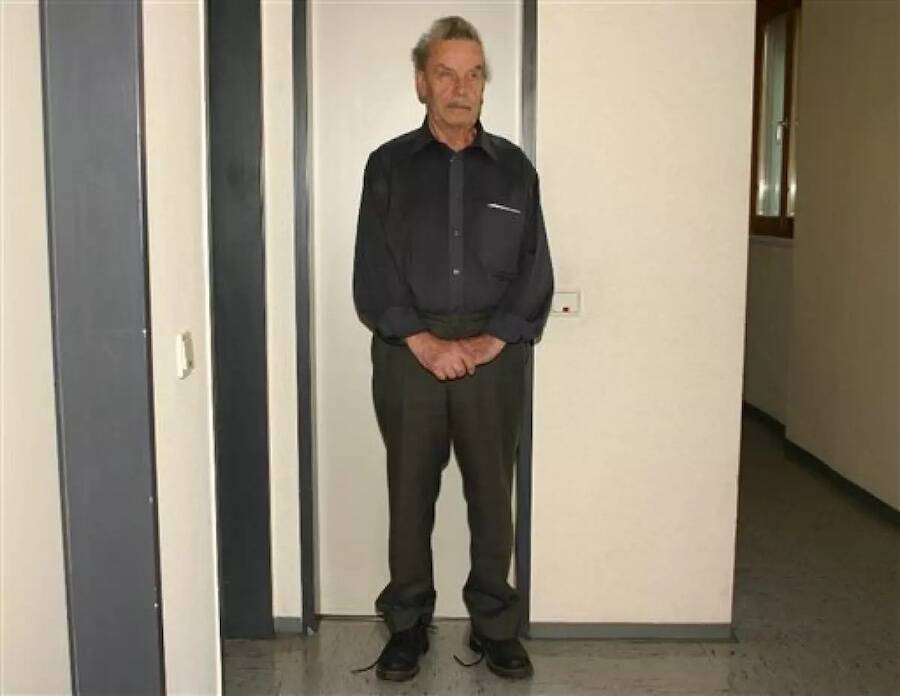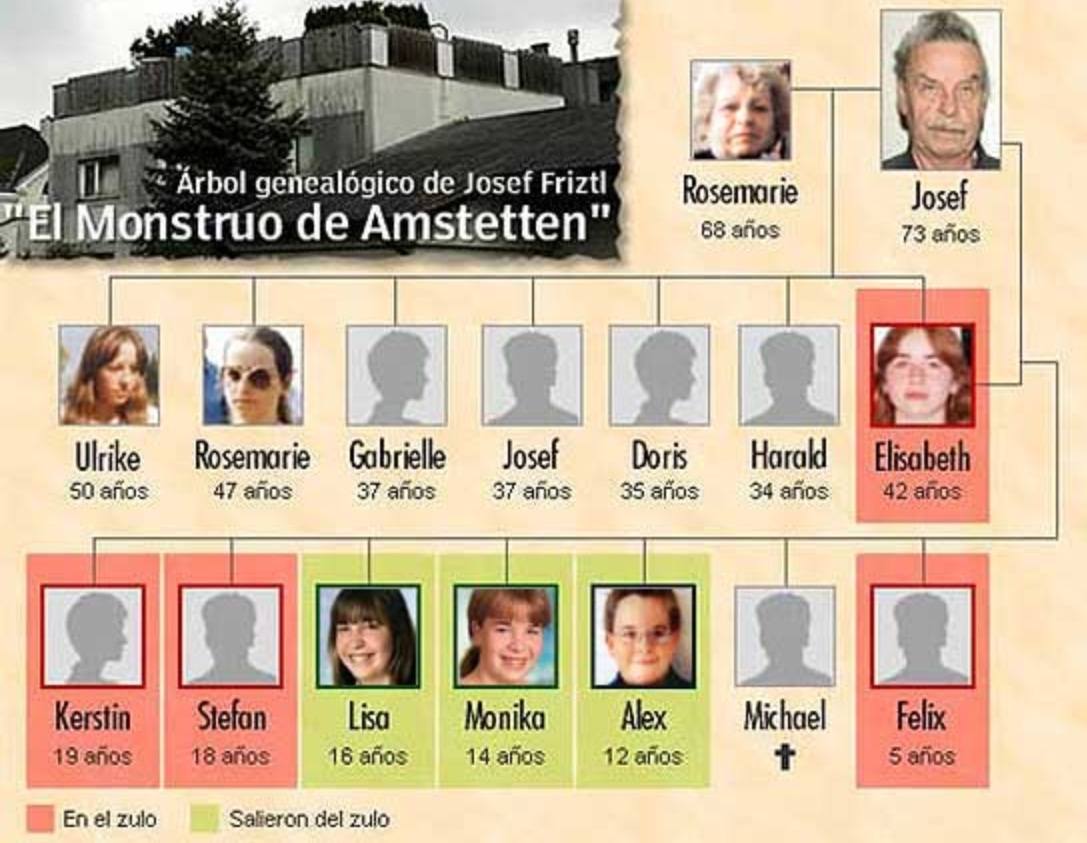Some stories are so shocking they leave an indelible mark on our collective consciousness. The name Josef Fritzl is one of those names that sends chills down your spine. It’s not just a story; it’s a cautionary tale about the darkness that can lurk within the human psyche. But what really happened? Who was this man, and how did his actions go unnoticed for so long?
When you first hear about Josef Fritzl, it feels like something out of a nightmare. A man who kept his own daughter imprisoned for over two decades, fathering seven children with her in a hidden basement. It sounds almost impossible to believe, yet it's all too real. This is a story that demands to be told, not just for its shocking nature but because it highlights the importance of vigilance and understanding the signs of abuse.
But before we dive deep into the grim details, let’s take a moment to reflect. This isn’t just about a single individual; it’s about the systems, the people, and the society that allowed such a monstrous act to occur. So buckle up, because this is going to be a tough but necessary read.
Read also:Caleb Winningham The Rising Star You Need To Know
Biography of Josef Fritzl: A Life Unveiled
Let’s start by getting to know the man behind the headlines. Josef Fritzl was born on April 20, 1939, in Amstetten, Austria. On the surface, he seemed like any other man living an ordinary life. But beneath that veneer of normalcy lay a secret so horrifying it would shock the world when it finally came to light in 2008.
Here’s a quick look at his life through the years:
| Full Name | Josef Fritzl |
|---|---|
| Date of Birth | April 20, 1939 |
| Place of Birth | Amstetten, Austria |
| Occupation | Electrical Engineer |
| Marital Status | Married to Rosalie Zimmerl |
| Children | Three with Rosalie Zimmerl, Seven with Elisabeth Fritzl |
Looking at these details, it’s hard to imagine the man behind the mask. But as we’ll see, appearances can be deceiving.
Understanding the Horror: The Fritzl Case Explained
So, what exactly happened? In 1984, Josef Fritzl abducted his own daughter, Elisabeth, and locked her in a specially constructed basement beneath his home. For the next 24 years, she remained imprisoned there, subjected to unimaginable horrors. During that time, Fritzl fathered seven children with her, six of whom survived.
Now, you might be wondering how something like this could go unnoticed for so long. The answer lies in the meticulous planning and manipulation by Fritzl. He created an elaborate web of lies, convincing his family and the community that Elisabeth had run away. Meanwhile, the children born in captivity were either kept hidden or introduced into the family under false pretenses.
It wasn’t until 2008 that the truth finally came to light. Elisabeth’s eldest daughter, Kerstin, fell seriously ill and needed medical attention. Fritzl, fearing exposure, called for an ambulance, claiming the girl had been found in a nearby forest. However, the authorities grew suspicious when tests revealed that Kerstin’s DNA matched Fritzl’s and Elisabeth’s. The rest, as they say, is history.
Read also:2024 Planetary Alignment A Cosmic Event You Donrsquot Want To Miss
Breaking Down the Facts: What Really Happened?
Who Was Elisabeth Fritzl?
Elisabeth Fritzl was born on July 26, 1974, and was the third child of Josef and Rosalie Fritzl. Described as a bright and cheerful girl, her life took a dark turn when she was just 18 years old. Abducted by her own father, she was subjected to years of physical and psychological abuse. Despite the unimaginable circumstances, Elisabeth managed to maintain her sanity and even raised her children with love and care.
The Hidden Basement: A House of Horrors
The basement where Elisabeth was held was a labyrinth of rooms equipped with beds, toilets, and even a kitchen. Fritzl designed it to be completely self-contained, ensuring that his captive could survive indefinitely without detection. The level of detail and planning involved is both impressive and deeply disturbing.
Psychological Insights: Inside the Mind of a Monster
What drives someone to commit such heinous acts? Psychologists have long debated the motivations behind Fritzl’s actions. Some suggest that his behavior was rooted in a severe personality disorder, while others point to environmental factors such as childhood trauma. Regardless of the cause, one thing is certain: Fritzl’s actions were a product of a deeply twisted mind.
Here are some key psychological insights:
- Narcissistic Personality Disorder: Fritzl exhibited classic signs of narcissism, including a grandiose sense of self-importance and a lack of empathy for others.
- Control Freak: His need for control extended beyond just his immediate family, manifesting in his meticulous planning and execution of the crime.
- Sexual Deviancy: The sexual exploitation of his own daughter points to a severe form of deviant behavior.
The Aftermath: Justice and Redemption
The Trial and Sentencing
Josef Fritzl’s trial began in 2009, capturing the attention of the entire world. Despite his initial denial, Fritzl eventually confessed to his crimes, claiming that he had acted out of a twisted sense of love. The court, however, saw things differently, sentencing him to life imprisonment without the possibility of parole.
Elisabeth’s Journey to Recovery
For Elisabeth, the road to recovery has been long and arduous. With the help of therapists and support groups, she has slowly begun to rebuild her life. Her courage and resilience serve as a testament to the strength of the human spirit.
Lessons Learned: Preventing Future Tragedies
The Fritzl case serves as a stark reminder of the importance of awareness and vigilance. Here are some key takeaways:
- Recognizing Signs of Abuse: It’s crucial to be aware of the signs of abuse and report any suspicions to the authorities.
- Community Responsibility: Neighbors and community members play a vital role in identifying and reporting suspicious behavior.
- Legal Protections: Strengthening laws and increasing penalties for perpetrators can serve as a deterrent to future crimes.
Impact on Society: A Wake-Up Call
The Fritzl case had a profound impact on Austrian society, sparking widespread debates about domestic abuse, child protection, and mental health. It also led to significant changes in legislation, with new laws being enacted to better protect victims and hold perpetrators accountable.
Media Coverage: The Global Reaction
International Outrage
The media coverage of the Fritzl case was extensive, with outlets around the world reporting on the shocking details. The public reaction was one of disbelief and outrage, as people struggled to comprehend the depth of Fritzl’s depravity.
Documentaries and Films
In the years since the case broke, several documentaries and films have been produced, shedding light on the events and exploring the psychological aspects of the crime. These productions have helped keep the conversation alive, ensuring that the lessons learned from this tragedy are not forgotten.
Conclusion: Reflecting on the Fritzl Case
In conclusion, the Josef Fritzl case is a harrowing reminder of the darkness that can exist within the human heart. But it’s also a story of resilience and hope, as Elisabeth and her children continue to rebuild their lives. As we move forward, it’s important to remember the lessons learned and work towards creating a safer, more compassionate society.
We urge you to share this article, start conversations, and raise awareness about the signs of abuse. Together, we can make a difference. And remember, if you or someone you know is in a dangerous situation, don’t hesitate to reach out for help. Your voice matters.
Table of Contents
- Biography of Josef Fritzl: A Life Unveiled
- Understanding the Horror: The Fritzl Case Explained
- Breaking Down the Facts: What Really Happened?
- Psychological Insights: Inside the Mind of a Monster
- The Aftermath: Justice and Redemption
- Lessons Learned: Preventing Future Tragedies
- Impact on Society: A Wake-Up Call
- Media Coverage: The Global Reaction
- Conclusion: Reflecting on the Fritzl Case


